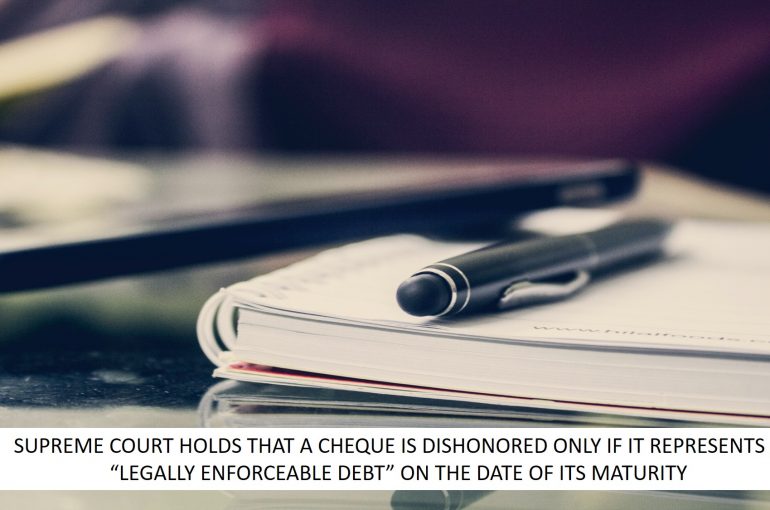SUPREME COURT HOLDS THAT A CHEQUE IS DISHONORED ONLY IF IT REPRESENTS A “LEGALLY ENFORCEABLE DEBT” ON THE DATE OF ITS MATURITY
Recently, a two Judge Bench of the Supreme Court comprising of Justice Dr. Dhananjaya Y Chandrachud and Justice Hima Kohli passed a Judgment dated 11.10.2022 in DASHRATHBHAI TRIKAMBHAI PATEL V. HITESH MAHENDRABHAI PATEL & ANR. IN CRIMINAL APPEAL NO. 1497 OF 2022, and held that for the commission of an offence under Section 138 of Negotiable Instruments Act (NI Act), 1881 (Dishonour of cheque for insufficiency, etc., of funds in the account) a cheque that is dishonoured must represent a legally enforceable debt on the date of maturity or presentation. The Apex Court has further clarified that if the drawer of the cheque pays a part or whole of the sum between the period when the cheque is drawn and when it is encashed upon maturity, then the legally enforceable debt on the date of maturity would not be the sum represented on the Cheque.
FACTS
On 10.04.2014, the Appellant issued a statutory notice under Section 138 of the NI Act to the first Respondent-Accused. It was alleged that the first Respondent borrowed a sum of Rs. 20,00,000/- from the Appellant on 16.01.2012 and to discharge the liability, issued a Cheque dated 17.03.2014 bearing Cheque No. 877828 for the said sum. When the said Cheque was presented on 02.04.2014, it was dishonored due to insufficient funds.
On 12.05.2014, the Appellant filed a Criminal Complaint against the first Respondent for the offence under Section 138 of the NI Act before the Trial Court. By a Judgment dated 30.08.2016, the Trial Court acquitted the first Respondent on the ground that the first Respondent paid the Appellant a sum of Rs. 4,09,315/- between 08.04.2012 and 30.12.2013 partly discharging his liability in respect of the Debt of Rs. 20,00,000/-.
The Appellant filed an Appeal against the Judgment of the Trial Court before the Gujarat High Court. The High Court by its Judgment dated 12.01.2022 dismissed the Appeal, thereby upholding the judgment of the Trial Court that acquitted the first Respondent and affirmed the finding of the facts of the Trial Court that a part of the Debt owed by the first Respondent to the Appellant was discharged and thus the Notice of Demand in respect of full Debt issued under Section 138 of the NI Act is not valid.
ISSUE
Whether the offence under Section 138 of the NI Act would be deemed to have been committed if the cheque that is dishonored does not represent the full amount of the enforceable debt at the time of encashment?
REASONING AND ANALYSIS
Aggrieved by the aforementioned Order dated 12.01.2022 of the Gujarat High Court, the Appellant moved the Supreme Court under Article 136 of the Constitution of India.
The Apex Court relied on the Judgement, Suman Sethi v. Ajay K Churiwal, (2000) 2 SCC 38, wherein the appellant issued a cheque for Rs. 20,00,000/- in favour of the first Respondent, which was dishonored. A demand notice for an amount higher than the cheque amount was issued. A two-Judge Bench of the Supreme Court held that “the demand has to be made for the ‘said amount’, which is the cheque amount. It was also observed that the question of whether the notice demanding an amount higher than the cheque amount is valid would depend on the language of the notice.”
In the present case, the Apex Court made the following observations:
- “For the commission of an offence under Section 138 of the NI Act, the Cheque that is dishonored must represent a legally enforceable debt on the date of maturity or presentation.
- If the drawer of the Cheque pays a part or whole of the sum between the period when the Cheque is drawn and when it is encashed upon maturity, then the legally enforceable debt on the date of maturity would not be the sum represented on the Cheque.
- When a part or whole of the sum represented on the Cheque is paid by the drawer of the Cheque, it must be endorsed on the Cheque as prescribed in Section 56 of the NI Act. The Cheque endorsed with the payment made may be used to negotiate the balance, if any. If the Cheque that is endorsed is dishonored when it is sought to be encashed upon maturity, then the offence under Section 138 will stand attracted
- The first Respondent has made part-payments after the debt was incurred and before the Cheque was encashed upon maturity. The sum of rupees twenty lakhs represented on the Cheque was not the ‘legally enforceable debt’ on the date of maturity. Thus, the first Respondent cannot be deemed to have committed an offence under Section 138 of the NI Act when the Cheque was dishonoured for insufficient funds; and
- The notice demanding the payment of the ‘said amount of money’ has been interpreted by judgments of this Court to mean the Cheque amount. The conditions stipulated in the provisos to Section 138 of the NI Act need to be fulfilled in addition to the ingredients in the substantive part of Section 138 of the NI Act. Since in this case, the first Respondent has not committed an offence under Section 138, the validity of the form of the notice need not be decided.”
Conclusion
Thus, based on the aforesaid observations, the Apex Court held that a Cheque is dishonored only if it represents a “legally enforceable debt” on the date of its maturity or presentation and in the present case, the sum of Rs. 20 Lakhs represented on the Cheque was not the ‘legally enforceable debt’ as on the date of maturity. Thus, the Supreme Court dismissed the Appeal and set aside the Judgment of the Gujarat High Court dated 12.01.2022.
Devashish Kakkar
Legal Associate
The Indian Lawyer





































Leave a Reply